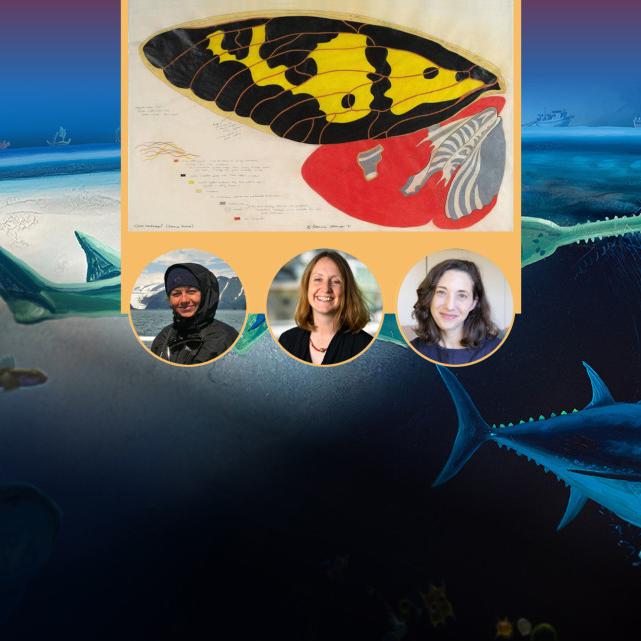When Nini Kaur ’26 found out that President Biden was visiting her hometown of Pueblo, Colo. to talk about climate programs, she knew she had the perfect subject for her class assignment.
Kaur and other students in Prof. Caroline Levine’s Communicating Climate Change class last fall were tasked with writing an opinion piece spurring readers to take action related to climate, to appear in a newspaper of their choice. Levine is the David and Kathleen Ryan Professor of Humanities in the Department of Literatures in English in the College of Arts & Sciences.
“I wanted to encourage people to go to the (president’s) visit and ask questions,” said Kaur, an environment and sustainability major in the College of Agriculture and Life Sciences (CALS). Her piece, “As Pueblo’s role in healing climate gets Biden’s attention, we must take care of locals still at risk,” was published Nov. 29 in the Colorado Sun.
“I know that if I want to go into this field and make a difference, I need to be willing to communicate and share ideas in a way that’s effective and make my voice heard in an impactful way,” she said.
Kaur said the class taught her ways to communicate the seriousness of climate change in a way that would help people feel empowered to take action, rather than hopelessly doom-scroll through the news.
Along with the opinion pieces, students in the class practiced a range of communication strategies, including interviews, photographs, stories and ways to present data so that it’s understandable and not overwhelming.
“Most students are well aware of the climate crisis but still feel hopeless and helpless in the face of this accelerating catastrophe,” Levine said. “We focus on communication that goes beyond awareness to prompt meaningful action.”
Reaction to Kaur’s column made her realize that people in Pueblo care deeply about environmental issues. People sent her information about initiatives already underway to address climate change’s impacts on marginalized communities; others sent her info on other training programs related to climate and she was even invited to join a Pueblo advisory committee related to energy.
Kaur’s concentration within the A&S major is on sustainable business and the environmental economy because she thinks climate change solutions will need to come from business.
“Businesses hold a lot of power to make large decisions, so to be able to make actual change, we need to understand how businesses and business leaders think,” she said. “We all want to save the Earth, but we also care about our livelihoods.”
The problem of 'wish-cycling'
Nuo Cen ’26 decided to focus her opinion piece on the issue of “wish-cycling” in Ithaca, the practice of throwing non-recyclable items into recycling bins. As an international student from China, where recycling rules aren’t strictly enforced, Cen was glad to see Ithaca’s efforts, but soon learned that community residents don’t always know or follow basic recycling rules.
Her piece, “Rethinking Recycling Reality: Horror Behind Wish-Cycling,” appeared Nov. 9 in the Ithaca Times.
“After careful consideration and several rounds of research, I decided to encourage readers to utilize the Tompkins Recycling Search Tool and participate in the local curbside recycling program,” said Cen, who’s majoring in environment and sustainability and information science in CALS.
As she was thinking about her piece, Cen thought it was important to emphasize unified action as a way to address climate change issues.
“Emphasizing the value of collective effort in addressing climate change, particularly in the case of wish-cycling where a single misplaced item can contaminate an entire bin of recyclables, underscores the significance of unified action,” she said. “Op-eds serve as a potent tool to not only inform but also engage and inspire collective action among Ithaca residents in tackling environmental challenges.”
Levine’s idea for the class stemmed from some of her past research on the ways that different forms of media are used to represent and understand climate change.
“It’s hard to grasp a phenomenon so vast and so frightening, and if we stress the dangers people will often shut down. Students have to learn how to be creative in communicating effectively,” she said. She has taught the class for four years and always has a large group of students who sign up.
“I’ve increasingly focused the class on communicating to peers on campus,” said Levine. “Students are often cynical about the university’s response to climate change, but I’ve found over the years that most of them don’t actually know the details of our campus carbon footprint, and are surprised to learn about successes, like Lake Source Cooling, the divestment of the endowment, the campus switch to LED lighting or our robust composting program. They also don’t know that open fume hoods in labs and faculty and staff air travel are some of the largest sources of fossil fuel emissions.”
Levine’s final assignment to the class was to develop communications campaigns to inform Cornellians about the facts. “Communicating specific accomplishments can help us to feel less hopeless, while communicating areas we can improve empowers us to make change.“
Encouraging plant-based foods in school
Even though the conversations related to food and climate change can become heated, Ashley Stagnari ’24 decided to focus her opinion piece on that issue.
Her piece, “Cut the carbon: A plant-based solution to climate change,” published Dec. 13 in the Record-Review, encouraged her local school board to consider adding more plant-rich options and meal days to the school district’s cafeterias.
“As a vegan myself for three years now, I learned that confronting the climate crisis requires us to critically think about the life cycle of food and its impact on the planet we call home,” said Stagnari, also an environment and sustainability major in CALS. “I wanted to confront some misunderstandings about plant-based eating while emphasizing ways individuals can collectively reorient food choices toward sustainable alternatives.”
Stagnari said the class has allowed her to rethink the way she approaches climate conversations and the ways in which promoting collective sustainable behavior change can be developed from multimedia communication.
“Carefully and creatively sharing information, data, and resources is essential as we navigate the climate crisis,” she said. “Written communication, like an op-ed, is one piece of the climate action puzzle that holds the power to inspire collective, sustained work.”







